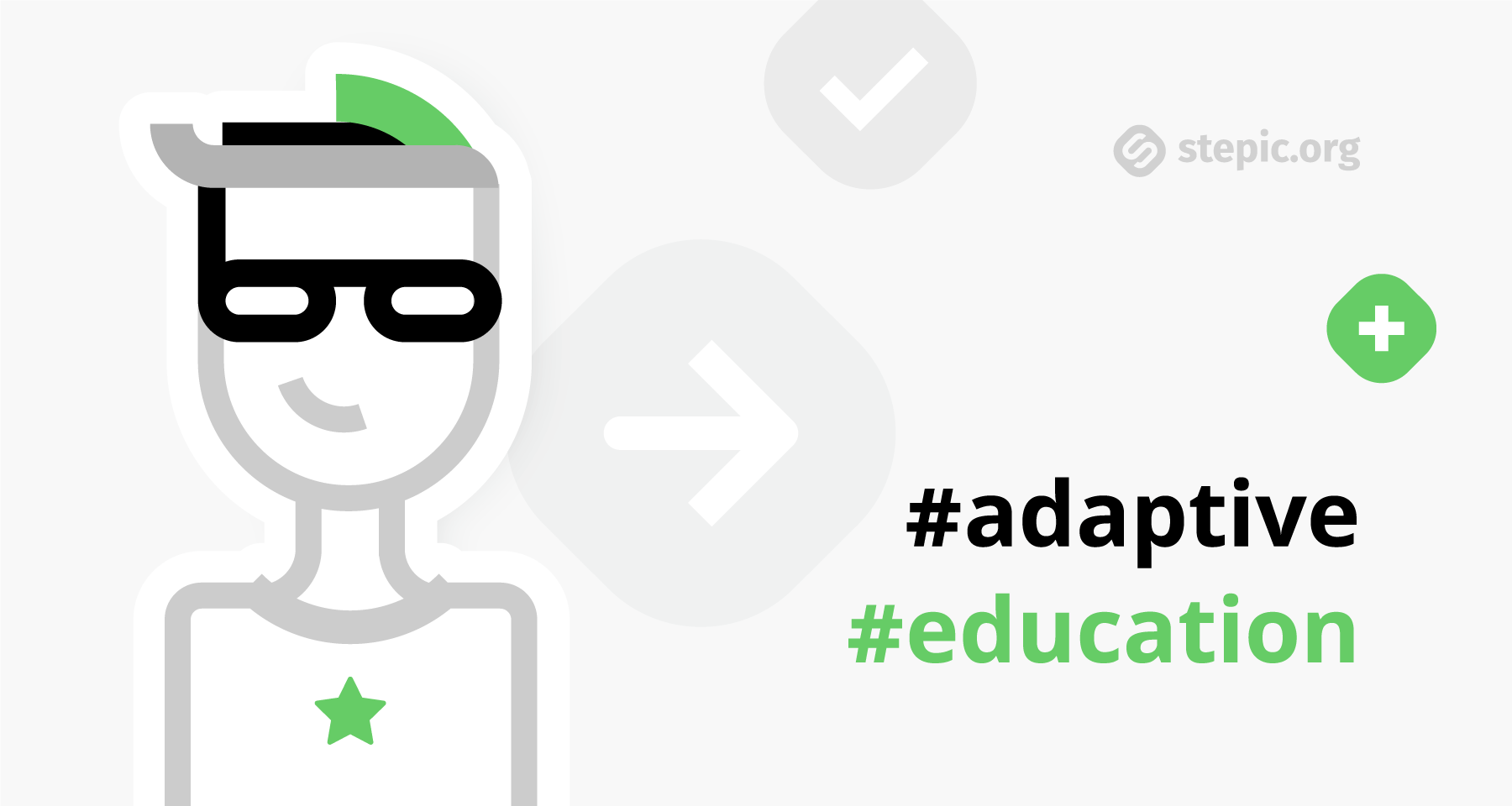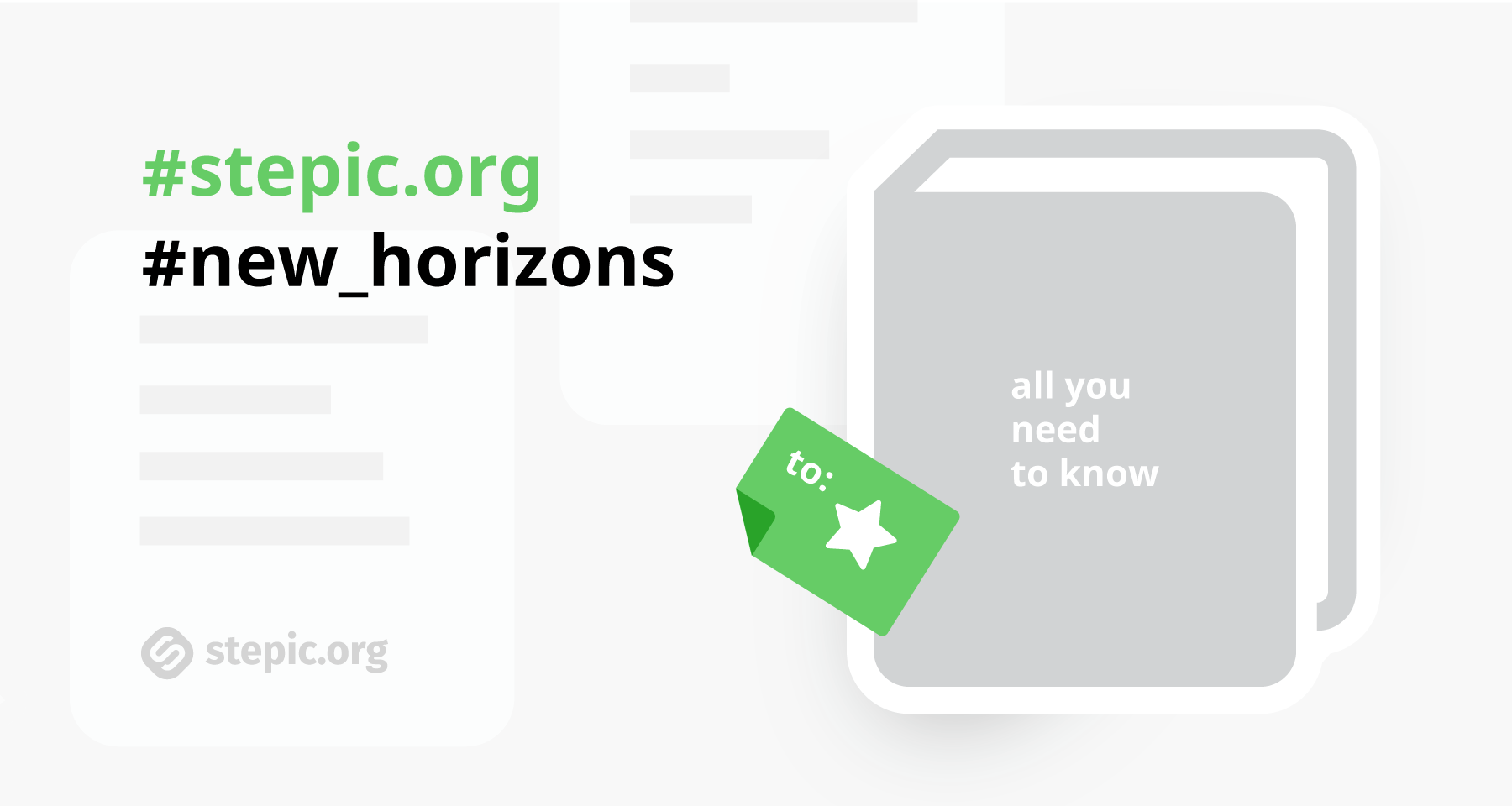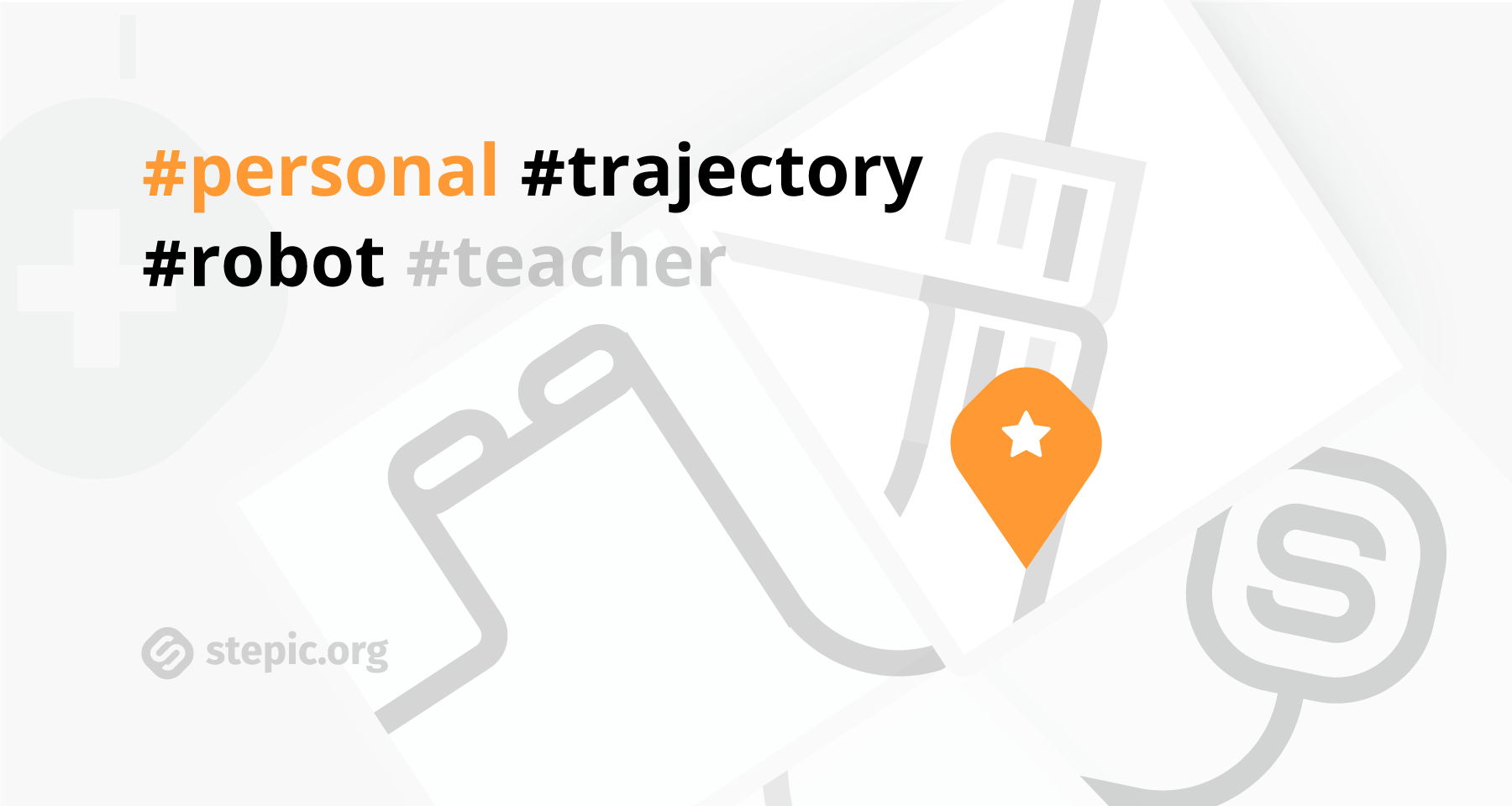Recommended systems in online education
On April 28, 2016, we officially announced the launch of the first adaptive course on Stepic.org , which selects tasks in Python depending on the level of the student. Before that, we still implemented recommended lessons on the platform, so that the students would not forget that they had already passed, and opened for themselves new topics that might interest them.
With this article we begin the cycle on recommender systems and adaptive learning.
There are two main themes under the cut:

')
This part is more introductory, characterizing online education, exciting details of recommender systems under the following picture :)
In today's world, online education is gradually becoming more and more popular. The opportunity to learn from professors of leading educational institutions, to study new areas, to obtain the necessary knowledge in the work, without leaving home, attracts a large number of people.
One of the most common forms of online learning is mass open online courses (MOOCs, Massive Open Online Courses). Most often they include videos, slides and textual content prepared by the teacher, as well as tasks for testing knowledge, which are usually checked automatically, but it is also possible for students to check each other's works. The tasks can be offered a wide variety of types of tasks: from simple selection of the correct answer to writing an essay, and even, as we have on Stepic, programming tasks with automatic verification.
Online education has its own characteristics that distinguish it from regular, offline education. Among the advantages, first of all, the accessibility already mentioned above to everyone who has access to the Internet. Secondly, this is almost unlimited scalability: thanks to automated testing of tasks in a course, thousands of people can learn at the same time, which is incomparable with regular courses in classrooms. Thirdly, each student can choose a convenient time and pace for the passage of the material. Fourthly, teachers have a large amount of data on how users pass his courses, which he can use to analyze and improve his materials.
At the same time, there are disadvantages to online learning. Unlike traditional education, where the student always has the motivation to evaluate his academic performance, in the case of online courses there are no penalties for a non-completed course. Because of this, the percentage of graduates who enrolled in it rarely exceeds 10% (we have the best EdCrunch Awards 2015 course by Anatoly Karpov's Fundamentals of Statistics at the first launch of a record 17% of enrolled, but this is the exception). In addition, due to the large number of students, the teacher does not have the opportunity to give individual attention to each student according to his level and possibilities.

We set ourselves a task - to create a recommendation system that could advise a student of interesting content and take into account his level of training and gaps in knowledge. In addition, the system should be able to assess the complexity of the content. This is necessary, in particular, for adaptive recommendations that will help the user to study the material, flexibly adjusting to it, offering exactly the content that he needs now for learning. Such a system will be useful to users of personalized lesson recommendations that can help them explore a particular topic or suggest something new.
In general, learning should have become even more interesting!
One of the first examples of a recommender system in the modern view is movielens.org , which offers users movies based on their preferences. This service is interesting because it provides everyone with an extensive set of data about the films and ratings put by them by users. This data set has been used in a variety of research in the field of recommender systems of the last two decades.
We have created a hybrid system with more active use of content filtering and less active - collaborative filtering.
There are many studies on recommender systems for technology-based learning (Technology Enhanced Learning) . The specificity of the task in this case adds new directions for the development of a recommendatory system.

What are the features of the recommendatory system of an educational project?
First, it is the ability to build an adaptive recommender system that will adapt to the needs of the user at a particular moment and offer him the best ways to study the material . In this format, various simulators can be implemented, for example, in mathematics or any programming language, containing many tasks of different complexity, of which different students will approach different at each time point.
Secondly, it is possible to extract the dependencies between the training materials from the data on how users pass them.
These data can help to extract individual topics in the materials, the links between these topics, their correlations in complexity .
Coursera, EdX, Udacity (online learning platforms) use their recommendation systems, advising users of courses that may interest them. The disadvantage of these recommendations is that they can offer only the entire course, but not some part of it, even if the user is only interested in it. Also, the system constructed in this way cannot help the user in studying the course he has chosen.
The recommendation resource system MathsGarden , on the contrary, works with the smallest parts of the content - individual tasks. It is an elementary arithmetic simulator for elementary school students, which offers the student the tasks that are best suited to him at the given time in terms of complexity.
To do this, the system calculates and dynamically changes the relative characteristics of the student’s knowledge, as well as the complexity of the tasks, but more on that later.
In the following articles, we will tell you more about the Stepic.org device and the implementation of the recommender system, define what an adaptive recommender system is, and analyze the results in detail. It will be fun :)
With this article we begin the cycle on recommender systems and adaptive learning.
There are two main themes under the cut:
- about online education, pros / cons / pitfalls;
- classification of recommender systems, their applicability in education, examples.

')
About online education, its pros, cons and pitfalls
This part is more introductory, characterizing online education, exciting details of recommender systems under the following picture :)
In today's world, online education is gradually becoming more and more popular. The opportunity to learn from professors of leading educational institutions, to study new areas, to obtain the necessary knowledge in the work, without leaving home, attracts a large number of people.
One of the most common forms of online learning is mass open online courses (MOOCs, Massive Open Online Courses). Most often they include videos, slides and textual content prepared by the teacher, as well as tasks for testing knowledge, which are usually checked automatically, but it is also possible for students to check each other's works. The tasks can be offered a wide variety of types of tasks: from simple selection of the correct answer to writing an essay, and even, as we have on Stepic, programming tasks with automatic verification.
Online education has its own characteristics that distinguish it from regular, offline education. Among the advantages, first of all, the accessibility already mentioned above to everyone who has access to the Internet. Secondly, this is almost unlimited scalability: thanks to automated testing of tasks in a course, thousands of people can learn at the same time, which is incomparable with regular courses in classrooms. Thirdly, each student can choose a convenient time and pace for the passage of the material. Fourthly, teachers have a large amount of data on how users pass his courses, which he can use to analyze and improve his materials.
At the same time, there are disadvantages to online learning. Unlike traditional education, where the student always has the motivation to evaluate his academic performance, in the case of online courses there are no penalties for a non-completed course. Because of this, the percentage of graduates who enrolled in it rarely exceeds 10% (we have the best EdCrunch Awards 2015 course by Anatoly Karpov's Fundamentals of Statistics at the first launch of a record 17% of enrolled, but this is the exception). In addition, due to the large number of students, the teacher does not have the opportunity to give individual attention to each student according to his level and possibilities.

Recommender systems: on Stepic.org and in general
We set ourselves a task - to create a recommendation system that could advise a student of interesting content and take into account his level of training and gaps in knowledge. In addition, the system should be able to assess the complexity of the content. This is necessary, in particular, for adaptive recommendations that will help the user to study the material, flexibly adjusting to it, offering exactly the content that he needs now for learning. Such a system will be useful to users of personalized lesson recommendations that can help them explore a particular topic or suggest something new.
In general, learning should have become even more interesting!
Existing recommendation systems
One of the first examples of a recommender system in the modern view is movielens.org , which offers users movies based on their preferences. This service is interesting because it provides everyone with an extensive set of data about the films and ratings put by them by users. This data set has been used in a variety of research in the field of recommender systems of the last two decades.
Three main classes of recommendation systems:
- Systems based on content filtering. Such systems offer users a content similar to the one that they studied earlier. Similarity is calculated using the characteristics of the compared objects. For example, to recommend films, you can use the proximity of genres or cast. This approach is used in the service for assessing, searching and recommending Internet Movie Database movies.
- Systems using collaborative filtering. In this case, the user is offered content that interested similar users. The recommendations of the MovieLens service are based on this approach.
- Hybrid systems that combine the two previous approaches. This type of system is used in Netflix , a service for online watching movies and TV shows.
We have created a hybrid system with more active use of content filtering and less active - collaborative filtering.
There are many studies on recommender systems for technology-based learning (Technology Enhanced Learning) . The specificity of the task in this case adds new directions for the development of a recommendatory system.

What are the features of the recommendatory system of an educational project?
First, it is the ability to build an adaptive recommender system that will adapt to the needs of the user at a particular moment and offer him the best ways to study the material . In this format, various simulators can be implemented, for example, in mathematics or any programming language, containing many tasks of different complexity, of which different students will approach different at each time point.
Secondly, it is possible to extract the dependencies between the training materials from the data on how users pass them.
These data can help to extract individual topics in the materials, the links between these topics, their correlations in complexity .
Coursera, EdX, Udacity (online learning platforms) use their recommendation systems, advising users of courses that may interest them. The disadvantage of these recommendations is that they can offer only the entire course, but not some part of it, even if the user is only interested in it. Also, the system constructed in this way cannot help the user in studying the course he has chosen.
The recommendation resource system MathsGarden , on the contrary, works with the smallest parts of the content - individual tasks. It is an elementary arithmetic simulator for elementary school students, which offers the student the tasks that are best suited to him at the given time in terms of complexity.
To do this, the system calculates and dynamically changes the relative characteristics of the student’s knowledge, as well as the complexity of the tasks, but more on that later.
In the following articles, we will tell you more about the Stepic.org device and the implementation of the recommender system, define what an adaptive recommender system is, and analyze the results in detail. It will be fun :)
Source: https://habr.com/ru/post/302702/
All Articles